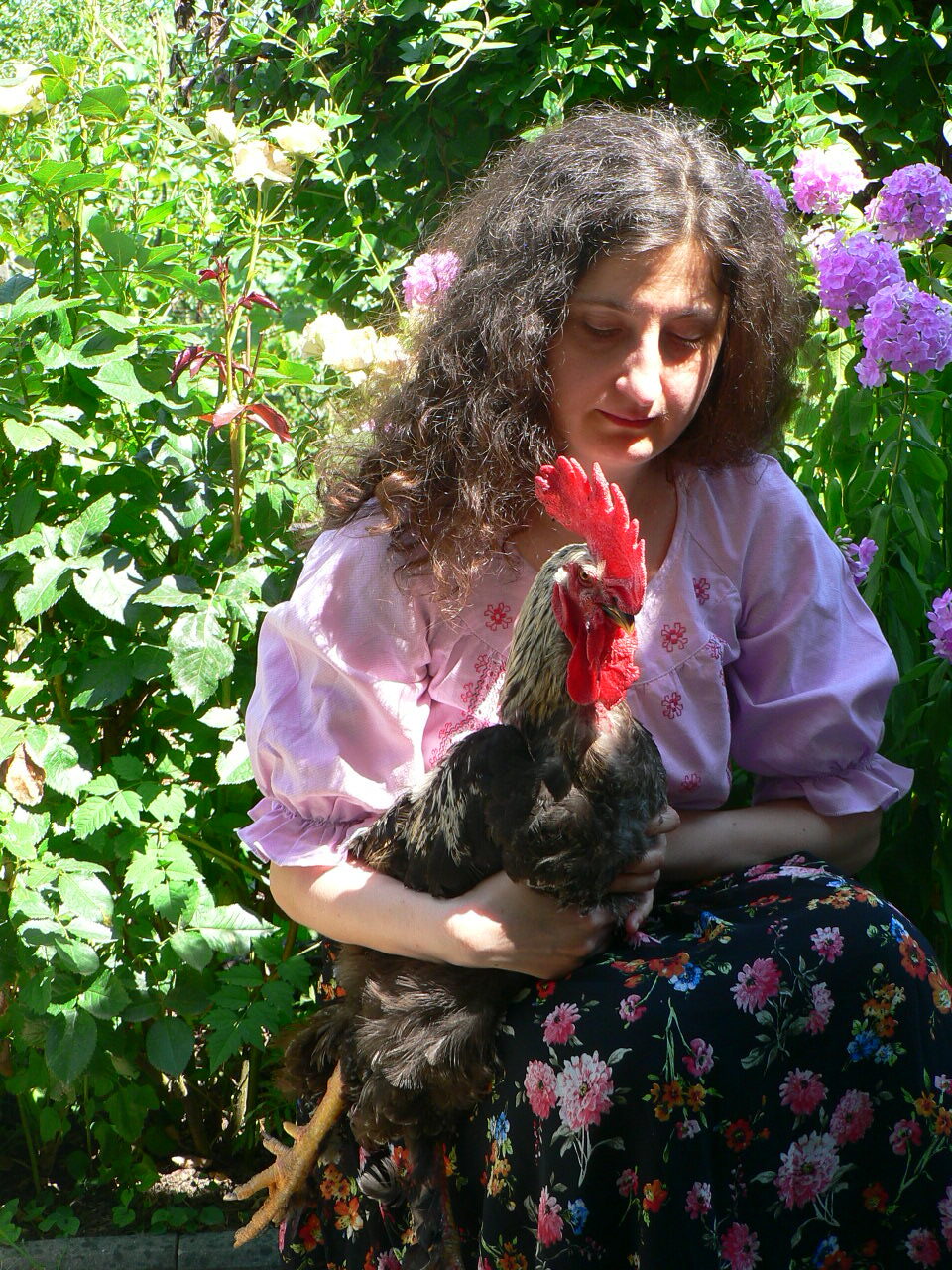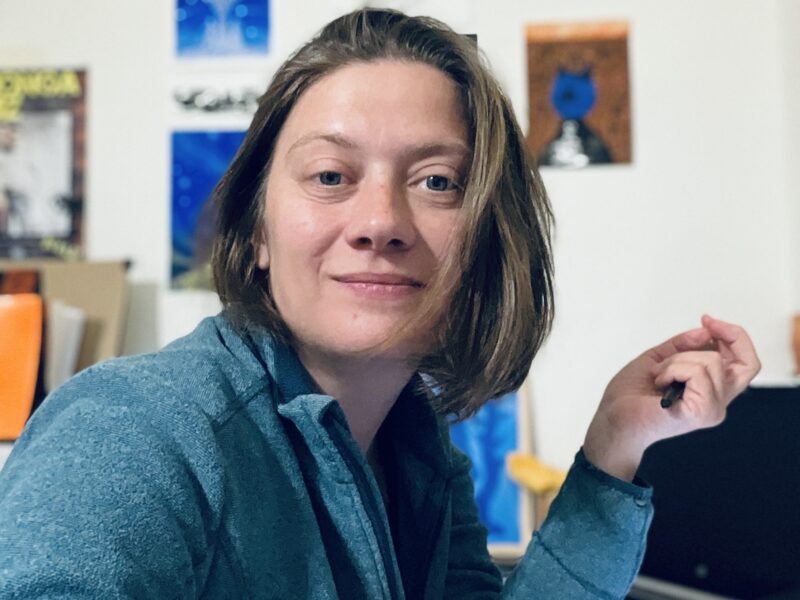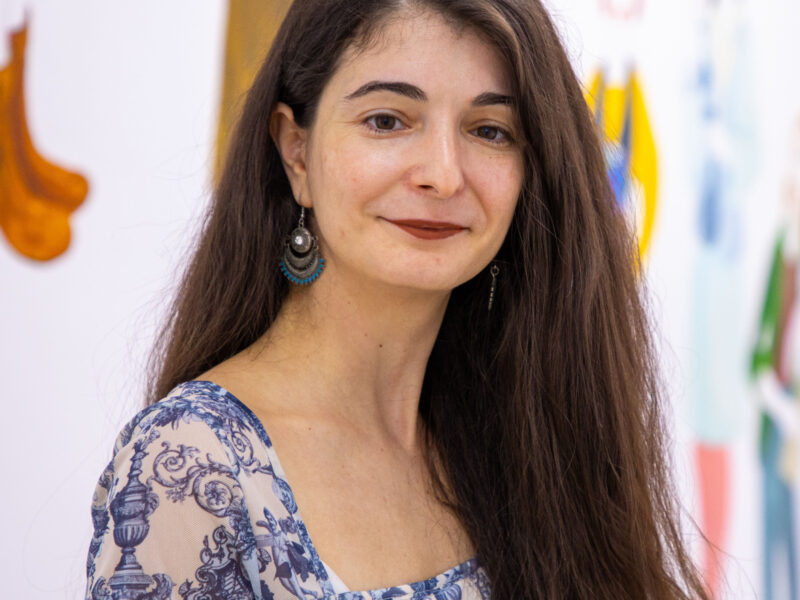Liliana Corobca is a writer and a researcher, studying the history of communism, especially censorship. She recently edited and published two large volumes of historical studies: Panorama comunismului în Moldova sovietică / An Overview on the Communism Regime in Soviet Moldova and Panorama comunismului în România / An Overview on the Communism Regime in Romania.Both published by Polirom Publishing House. Among her novels, also published by Polirom, there are Kinderland, translated into German and Slovenian, A Censor’s Notebook, which is to be published by Seven Stories Press in the USA, and, the latest, Buburuza / Ladybug. Humor and spontaneity are present both in her books and in discussions beyond them, thing which makes a long travel to the end of the world and humanity look as natural as a spontaneous crossing of the Alps.
Since we’re talking about the book industry, what book or books that you’re reading now would you recommend to others?
I’ve always found it difficult to answer those types of questions. The text most read by me lately has been The Constitution of Romania, and I recommend it with all my heart to the readers as a model of utopic, ironic and surrealist literature. I’ve just finished Situații paradoxale. Schițe umoristice, parodies by Vytautė Žilinskaitė (Literatura artistică Publishing House, Kishinev, 1983, translated into Romanian with a Cyrillic alphabet). Žilinskaitė (b. 1930) is a novelist and children’s literature writer from Lithuania. I kept the book nearby for a long time, but the thing is I can’t start intricate, long or too thick books after 8 hours of work. Short prose, humoristic texts were preferred for the pandemic times we’re going through. I found a couple of sketches very funny, impeccable, some others bearable, two of them boring. The book has a document value too, my researcher bulbs lighted up while I was reading. Humour was a very carefully watched domain, very censored and I found interesting to see what could go by the censorship scissors. From this point of view, the book is surprisingly topical and valuable. I don’t think my readings help the book industry too much, but I recommend the Lithuanian author with all my heart (to be translated in Romanian first).
You debuted in 2003, following the winning of a contest, with the volume Negrissimo in the Prima verba collection of the Arc Publishing House from Kishinev. How was your first contact with a publishing house as a writer?
It was a very serious debut contest, fair, with the manuscripts in envelopes; the members of the jury who read the texts didn’t know which is whose. Then, before the book come out, I went to the headquarters of the Arc Publishing House, that being the only visit at their office. It was summer, they called me to take my author picture, I didn’t have any. A day before I got herpes, I think I had herpes one more time in my life. I didn’t know what to do, I was stressed out, but the photographer calmed me and said that he’ll retouch it and it won’t be visible. And whoever sees and receives some explanations (you know, the bloody thing thought appropriate to came by just then!) tells me that the big mouth and thick lips are trending now. I remember the director of the publishing house, Iurie Bârsa, and the editor-in-chief, Mr. Eugen Lungu, both of them kindly suggested to me to pick a worthy pseudo name (after praising me for the book). I took their recommendation very seriously, but the search for a pseudonym was torturing, plus that my PhD thesis from 2001 had to come out or had come out already with my name, not a pseudonym, at the University of Bucharest Publishing House. I gave up eventually on the idea of changing the name. I remember that one of the options had been “Nicoară”, I liked it very much, but my mom didn’t. I remember her with a pen in her hand writing nicely on a piece of paper “Corobca”, showing it then to me: look how good it looks with those two o’s and an a at the end. I owe to my mom, actually, my writer name, my real name. I agreed with the publishing house, what kind of writer had the name “Corobca”? The Bessarabians knew Russian, and my name in Russian means “box”. I don’t remember what I responded to the publishing house and what came next. I’m glad however that I didn’t give up on my real name.
Since then you’ve collaborated with many publishing houses from Romania. What expectations do you have from a publishing house?
My first expectation and demand is to answer fast. If they like the book, very well, if they don’t - we find another publishing house. I appreciate dynamism, being myself very dynamic in many ways. Then I appreciate the professionalism, of course. I’m referring here to the entire team that brings the book from the electronic “manuscript” to the physical object.
What about the expectations of a publishing house from a writer, from your experience so far?
I think publishing houses expect the author to promote their books or make considerable efforts in that sense.
How do the negotiations with the editors who attended your books look like? Do you give up easily to their suggestions or do you try to keep your text in its original form?
I’d say I give up, when I do, rather out of politeness, because I don’t like to have bits of my texts cut off. Only later, after the book comes out, I realize that the suggestions were and are welcomed. But there are no actual negotiations in my case. In any case, I don’t feel them like that.
Most of your books, both the fiction ones and the nonfiction, were published at Polirom (or at Cartea Românească, when the brand was administrated by Polirom). How does the publishing process of a new volume work? Do you send them a query letter, do you simply send them the manuscript when it’s ready or do you take into account, when choosing a new subject, the instructions from the publishing house, the trends of the moment or the topics mostly appreciated by the readers?
Most of the time I sent the manuscript straight up when it was ready, or I suggested the book I was working on, from which I’d attach a short presentation fragment. Then the reply that they wanted to see the whole book would come, followed by a message of approval and a contract. I have never received any instructions from publishing houses about what to write. I even chose Ionesco myself, when I was invited to write a romanced biography. I try to avoid the trends of the moment when I can, both thematically and stylistically. I think diversity is more important and more appealing than what’s trending, and I’m the one who sets trends, I don’t follow them. I often engage in intense preoccupations that take up all of my time and I can’t manage to stay in touch with the new writings. I’ve been asking myself really often lately if new formulas, themes or stylistic approaches are possible. And if so, because the answer can only be affirmative, do I have the courage of taking a new path?
Your involvement in a book’s journey doesn’t stop when you submit a manuscript to the publishing house, not even when the volume is sent for print, but it continues by participating in launchings, book fairs, giving interviews and so on. What phase in the life of a book do you like best?
Yes, you’re right. I’m living a sort of “scriptio continua”. After I turn in the manuscript, I have another one (in my head or already in progress), while I launch a novel, another one is almost ready, I’m talking about Kinderland, but I’m holding in my hands Capătul drumului / The End of the Road... For this reason, I can’t have a (single) favourite moment, when actually my entire existence is dedicated to writing. Maybe the romantic beginning and the fulfilled ending, as writing phases? I start from some obsessions, strong images and I feel a great relief (synonym with happiness to a certain point) when I get rid of them, when I note them down. Launches, book fairs, and interviews are a modus vivendi already and, when they’re not too frequent, I’m waiting for them with great joy. This pandemic, when all of these (launches, fairs, festivals) disappeared, changed our perception, I think we’ll appreciate these meetings more when they are possible.
Did the fact that readers can now make contact easier with the writers change the book market dynamic, influencing the number of copies sold and the authors’ popularity?
Let’s say it did. We live in times when popularity, visibility, presence in the public space and on social media matter perhaps more than the actual book. I don’t think that readers’ contact with the writers is always in the favour of the latter, but few of them can afford to avoid such meetings, few of them dare to take stand against the rules of the market. Luckily, writers are artists too, and the “stage” they’re invited to stand on is not something traumatizing or unpleasant to many. I adore audience, the people that I have things to say to, but there are inadequate encounters too, when the reader’s expectations overwhelm me or the audience’s response does not live up to my expectations. There are situations when all I want is to write.
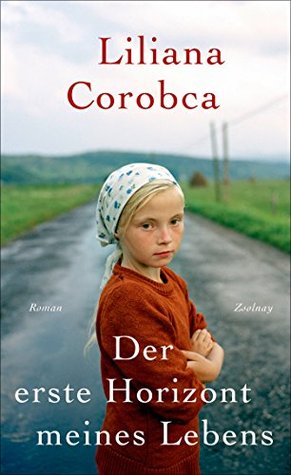
You were saying in an interview, talking about the readers’ urge to identify the author with the characters, that for the reader “a story you’re imagining” is not enough, “they want your blood to run through pages, they want your real and intense suffering, so they can respond just as intense”. Do you think this urge goes beyond the pages of a book, and it impinges on the writer’s personal life?
Thank God, not yet. With every written book I expand my thematic and social range of which I could speak decently. I’ve always considered that my personal life is below the level of the books I’m writing and, with age and and the number of my books increasing from year to year, I realize that it will identify more and more with the professional one, that I’m living profoundly in what I write. It’s true, there’s life after writing, but who knows what moment of my own existence will become the page of a novel attributed to God knows what character? It’s one of the reasons I am not really talking about my “personal life”. A writer doesn’t have one, everything becomes literature.
Talking about the readers. Do you like staying in touch with them? Online or, when possible, offline?
After a year of pandemic I discovered I like it more than I thought. I’m afraid not to disappoint or I try to be at the level of my books and that can be sometimes tiring or frustrating. I avoided online meetings. I like people, I’m curious to discover them, but not in their quality of readers, but for their humanity. I’m afraid of interacting with my readers, especially with the loyal ones.
You received numerous literary awards. How much do awards and nominations influence a book’s journey, especially book sales?
I think they do matter, but not too much. Firstly, the award industry in our country is still symbolic; secondly, it doesn’t have enough visibility. There are too little money invested in the value of the award and in its promotion and, as poets say,ex nihilo nihil. In our country, scholarships are not considered awards, and their purpose (when received) is to subsidise writing other books, not to sell existing ones. Otherwise, I’m happy for awards and nominations just like any other writer would be.
You find yourself among the exported Romanian writers, your books get to be translated and published in other languages too – German, Italian, Slovenian, and soon English. Did this success influence the Romanian editions of books?
I think so, not exclusively. Most of the times, there’s an extremely tight communication between the Romanian destiny and the international destiny of the books that come from us. The fact that they’ve been translated, they enjoyed success, that some of them have been taken over and re-edited by prestigious publishing houses (Kinderland was reissued by Büchergilde Gutenberg from Frankfurt am Main, a year after it had come out at Paul Zsolnay Verlag from Viena) etc. was rather overlooked on our market. I should’ve probably promoted them more (bragged more), but I considered that I should be modest. I’d rather write a new book than promote one I already wrote.
Did you collaborate with the translators and editors throughout for the foreign editions?
Yes, I answered to some questions and suggestions. I discovered things that I didn’t think about when I wrote. Translators read in great detail and ask very specific questions. I’m thinking of my most recent collaboration, with Monica Cure, the translator in English of the novel A Censor’s Notebook . It’s a difficult book, with play upon words or even invented words, with reference to the communist era. I think it was a great challenge for Monica. But we had some cool conversations! I’d receive a list with queries; we’d sometimes speak on the phone. It was very interesting. To give a couple of examples, with the permission of the wonderful translator:
Monica Cure: (p. 51) Şi scrii de parcă ai merge cu sorcova, oricine poate face aşa.
I was thinking that we don’t need a footnote here. It means doing something easily, as if it were a child’s play, isn’t it? I was thinking of “whistling down the street” because it has both movement and sound and the sense of playing while doing something “serious”. Did I miss something?
Liliana Corobca: ”Whistling down the street” is okay, you got the right meaning.
MC: (p. 62) Una e cutia închisă a Pandorei. Cine o va deschide va schimba ortodoxia. O revoluţie şi tot nu e de ajuns.
Is it orthodoxy in the sense of the norms or the Orthodox Church? I can’t be 100% sure from the context.
LC: In the sense of the right norms, the right code of laws.
MC: (p 80) Of, of, face Z. ochii rotunzi, sferele astea algebrice
Is it the idea that Z.’s eyes become round? Or does “ochii rotunzi” go with “sferele astea algebrice”?
LC: Yes, Z’s eyes become round with wonder.
MC: p. 152
Dar e mai ieftin poetul decât chirurgul! El doar aţâţă, nu costă nimic!
Cel fel de chirurg? Nu inteleg exact comparatia, desi as putea sa-l las pur si simplu asa.
LC: e istorie, fusese adoptată legea de interzicere a avortului, ca să găsești pe cineva care să se apuce să facă avort, care era ilegal, era scump de tot și ilegal. vezi legea din 1966
https://www.youtube.com/watch?v=5uhOlX28jK8
MC: p. 350 x 2
Poeţii sunt împăraţii noştri şi a lor va fi împărăţia, ca Iisus Hristos şi regii. Lor le aparţine viitorul şi adevărata religie or putere în mâinile lor se află!
Cum a fost a lui Iisus Hristos si a regiilor din trecut (Carol I etc) sau cum a fost cu Iisus Hristos si regiilor din vremea lui (unde ei pareau sa abia putere dar el a avut alt fel de putere)?
Is that "sau" a "și" in fact?
LC: Prin regii am avut in vedere acumularea de putere, nu la Carol I nici la vremea lui Isus nu m-am gîndit, ci la vîrful/culmea puterii si de stat și de credință. oricum, cenzorii erau atei, deci puțină confuzie este explicabilă, nu cred că trebuie precizări mai concrete aici.
Yes, sau (or) = și (and)
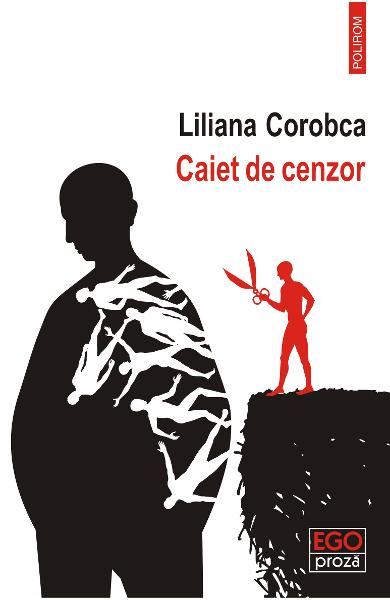
You’ve participated in launchings and promotion events of your translated books, as well as public readings as part of your writing scholarships or on other occasions. Do Romanian readers differ from the German or Slovenian ones, for example?
I can’t say much about Slovenian or Italian readers, because I attended international book fairs and festivals with participants from many countries, but the German public is very familiar to me. I’ve had many scholarships, tours, I’ve participated in readings and festivals and I’ve seen how it goes. First of all, they pay money to listen to a writer reading from a book. They come to readings, launchings etc. Then they buy the book. I’ve been on a tour through cities where people had no knowledge of my name, but people listened to what I was saying, asked questions and then they bought the book. I’ve never seen so much respect and interest for books!
You participated in book fairs and literature festivals from abroad. Which one of them did you like best?
I couldn’t choose. Each of them stuck with me with a certain thing, not necessarily with the literary part. At my first festival, at Torino, I didn’t know how to get to the train station from the airport, at Leukerbad, two Berliner writers set off to cross the Alps and they took me with them (Leukerbad is a mountain resort actually). I’ve never had a crazier journey; I’ve looked death in the eyes, so to say. At one point we got to a bridge over precipices that you couldn’t see the bottom of and I crossed it singing „La vie en rose”, I was the first one, courageous, with the Berliners following me. On the top of the Alps, where not even eagles flew, we found a trash bin with a roll of bags to clean the dog poop; we took a bag as a souvenir. In the same resort in Switzerland, we saw in a little shop a face cream (50g) that cost 350 (and another one 280) of Swiss francs. We were socked and picked our brains of how can a cream be so expensive. The version of the fellow writers was that it makes you look 10 years younger! At Vilenica, Slovenia, after a reading in a church, I received an award shaped like a heart, it was a mountain rock, colloured in grey, which I keep among books; I got to the Cúirt International Festival of Literature, Galway, Ireland, on a sunny day and I didn’t understand why people were lying on the ground, wherever they could, but they were enjoying the light and warmth of the sun after three months of rain and mud; they don’t have much sun throughout the year. I had time to visit cities, famous museums….
Have these experiences had any influence on your books, on the way you’re writing them or on the topic you’re tackling?
In brief, yes, they have. In Stuttgart I had an encounter with a boar that afterwards became a scene in Kinderland. In Graz I stayed all alone in a sort of Schloss (residence), on the top of a mountain, which was also a park, that they would lock at night, but we had the key. We, meaning the three writers, but the other two either hadn’t arrived yet, or they had already gone before I got there. I had got as a gift from one of the organizers a CD with religious music and I listened to it with at the highest volume… I needed that intense experience for Capătul drumului / The End of the Road . It made a difference getting to meet famous writers, translated in many languages, and to discover I’m no less than them… It meant more self-confidence and time for writing.
From your point of view, what do you think are the expectations of a foreign editor when it comes to writers of more “exotic” languages and what can these writers do to be more successful in other territories?
I wouldn’t go as far as generalizing. For some foreign editors, the writers of more “exotic” languages, as you’re saying, are pretty expensive, not everybody can afford to translate and publish them. For more success abroad they (the “exotics”) have to be supported financially more seriously. Every translation, tour and festival costs and an editor doesn’t necessarily want/can cover these expenses. It goes without saying that the value and novelty of the books matters, but there are less visible aspects, economic or political. The writer should be able to they deserve the editor’s attention, of any editor.
How did you get to participate in these events? Through personal contacts, help from Romanian public or private institutions or exclusively with the help of foreign ones?
All of those contributed and they worked harmoniously together. I mean there were Romanian and foreign institutions, personal contacts, friends, translators, artists who invited me or recommended scholarships, for example.
Two impressive studies have been published recently, Panorama comunismului în Moldova sovietică / An Overview on the Communism Regime in Soviet Moldova and and Panorama comunismului în România / An Overview on the Communism Regime in Romania.You initiated and edited these books and had to collaborate with many researchers and writers, although not for the first time, on the other side of the editorial table. What are the most important tactics and the most useful tools in completing such a project, when so many variables and subjective points of view are involved?
That’s a good question. I have asked myself that many times too. Panoramas are risky projects, and I don't like risks. You depend on others, and I don't like to depend on anyone. You need an enormous amount of patience, and I'm impatient and hasty. I sit and wonder how I managed to finish them. I don't know if I can talk about tactics or tools, I haven't thought about that. I know I’ve said to myself: I'm trying; we'll see what comes out. I worked with very intelligent, trained specialists, very different from each other, some of whom I did not know at all. If politeness can be called an "instrument," then that's the one. I did not get upset with people who did not respond or refused to take part in the projects, I tried to avoid public controversy that could bother or drive away some authors. I actually had "tailored" talks with each author and I tried to meet everyone's expectations, following my intuition. In some regards, some situations were getting ahead of me and I had to find solutions along the way. In some regards, some situations were getting ahead of me and I had to find solutions along the way.
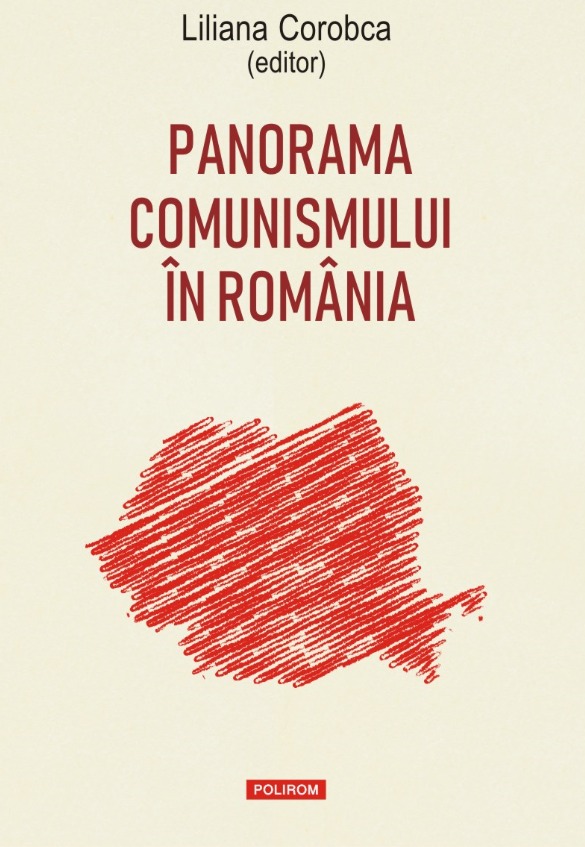
Which one of the two, fiction or historical studies, gives you the greater satisfaction?
I’m a writer and fiction is my greatest satisfaction, even the one based on historical research.
You said in an interview that you can't pay your bank installments with the money you get from books. But your books sent you on many travels. Where would you go now if everything went back to normal?
Did I say that? I don't remember ... I'm not a big fan of travelling. I would travel to... a book, my next book, the book within me. I don't have to go anywhere for that, any road would only take me away from the story I am dreaming of. There are many places that made me happy and I hope to see them again someday. As I’ve said before, I adore long roads with no end in sight, walking aimlessly, thinking of something or nothing. I would love to do that.

